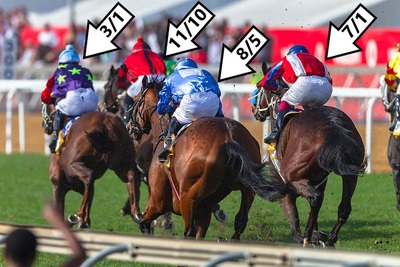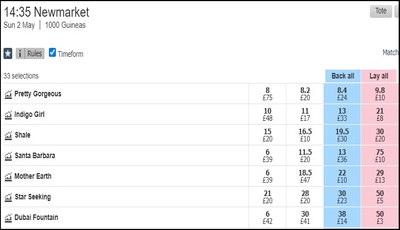 Many people may know the phrase “hedge your bets” without actually knowing where it comes from or what it really means in a gambling sense. The origins of the word are of less concern here, though for the record it dates back to the early 1600s (or maybe even earlier) and comes from the practice of “hedging” a piece of land – limiting it in size through the use of hedges to divide it up. Thus it came to take on the meaning of limiting one’s risk and that is principally to what hedging refers in the context here.
Many people may know the phrase “hedge your bets” without actually knowing where it comes from or what it really means in a gambling sense. The origins of the word are of less concern here, though for the record it dates back to the early 1600s (or maybe even earlier) and comes from the practice of “hedging” a piece of land – limiting it in size through the use of hedges to divide it up. Thus it came to take on the meaning of limiting one’s risk and that is principally to what hedging refers in the context here.
Technically speaking, when we talk about hedging a bet we mean placing an alternative bet or bets that limit the overall risk. However, increasingly hedging can be equally employed to mean locking in an overall net win by placing further bets.
Assuming you place a bet on Leeds United to win the FA Cup before the season begins at very nice odds of 250/1 you may choose to hedge that bet if they progress to a certain stage of the competition. For example, should they make the semi-finals the odds on them winning will probably drop to closer to 18/1 meaning that you could place bets on all the other sides left in the competition in order to secure a net win. Alternatively you could use a betting exchange to lay Leeds, thus securing the same or similar overall outcome of a net win no matter what.
This is technically trading but trading a bet (backing or laying at one price in the expectation the odds will change and thus allowing you to place a successful counter wager) is very similar to arbitrage and hedging; trading and “arbing” are all very closely linked.
Another similar example of hedging a bet would be if you place a large accumulator and the first nine of 10 selections all win. Be they horse races, football matches or anything else, you have the potential for a large net win but equally if that one final leg lets you down you win nothing. By laying the final selection – or betting on all the other possible outcomes – you hedge the bet and “lock in” a certain net win.
Hedging in the more traditional sense, however, means to place bets to limit your possible losses. So, if we assume you backed England to win the World Cup (what were you thinking?!) but then after the draw for the groups is made you decide your bet wasn’t such a good idea, you could hedge the bet by laying England and take a loss – but crucially a smaller loss. Equally, you could hedge the bet by placing wagers on Brazil, Germany and Argentina if they were the other teams in the group.
In this last sense hedging is not strictly limiting your losses but spreading your risk across a number of different outcomes. You could lose more but in practice you have an excellent chance of one of your bets winning to produce either an overall net win or a small loss.
As you can see, to hedge is a term that can mean many different things in the world of gambling and also in the financial world. In essence, any bet made after an original bet and placed on a different selection with the intention of changing the overall amount and pattern of risk, can be viewed as a hedge.
How to Hedge a Bet

As touched upon, there are different ways to go about hedging a bet and also slightly different approaches. We will now look in more detail at how you specifically carry this out and what you need to do to hedge your bets. Here we are not primarily concerned with what your end result will be or even what your motivation is, but rather the physical steps you would take to hedge successfully.
Whether you are looking to lock in a return, accept a fixed loss, or simply reduce your total risk, you can principally opt for one of three approaches:
- Cash out
- Dutching
- Laying at an exchange
Cash Out
 Cash out is a tool or facility offered by almost all of the best betting sites around. It is simple to use, largely automated and very popular with punters. It can be used whether your initial bet is doing well or badly and takes just a few clicks. However, cash out can only be used with the site where you made the initial wager.
Cash out is a tool or facility offered by almost all of the best betting sites around. It is simple to use, largely automated and very popular with punters. It can be used whether your initial bet is doing well or badly and takes just a few clicks. However, cash out can only be used with the site where you made the initial wager.
This does not give you flexibility and so you cannot shop around for a better price. In addition, should the site in question be down (for instance due to technical problems), you will not be able to hedge your bet using cash out. In-play, cash out also tends to be suspended a little more than the other options, further restricting you.
One final downside to cash out is that it is not available on all markets. Increasingly the biggest and best bookies offer it on a wide number of bets but the other methods of hedging are still better in terms of their availability. Individual markets will make it clear before you place the bet whether or not it is eligible for cash out.
To access cash out you just visit the bookmaker in question and then, depending on the site, you should be able to access cash out by:
- Clicking on the cash out tab
- Visiting the account area of the site and selecting the bet you want to cash out
- Going to “My bets”, “Live bets” or similar and picking the wager you want to hedge
All of our favourite bookies offer cash out and partial cash out. One might argue that actually taking full cash out – which means closing the bet entirely – is not really hedging at all. Instead, it is closing your position early and taking a fixed return or loss. However, with partial cash out, you leave some of your stake live, only ending a portion of it.
This means that you will get some sort of return on the portion that is cashed out, with the remainder left on at the original odds, which will either win or lose as before. You might cash out just a small portion of your stake or almost all of it, with one popular option when a bet is doing well being to cash out a value equal to your stake. This way, if the bet loses, you break even, whilst if it wins you still, hopefully, land a decent return.
Dutching
 Dutching is an advanced betting technique that primarily refers to a situation where it is possible to orchestrate a positive return by backing all outcomes in an event. This is typically done by exploiting odds differences with different bookies, however it can also be used as a way of hedging one’s bets.
Dutching is an advanced betting technique that primarily refers to a situation where it is possible to orchestrate a positive return by backing all outcomes in an event. This is typically done by exploiting odds differences with different bookies, however it can also be used as a way of hedging one’s bets.
As with the other two hedging methods, it can be used in a variety of ways to different ends. You might, for example, decide to back the home team to win but then hedge your bets by also betting on the draw. Of course, a bet on the Asian handicap +0.5, or double chance Home/Draw market, would also achieve this. But by Dutching in the match odds you could, for example, hedge a pre-match bet on the home win, by adding the draw in-play if you were unimpressed by how your pick had begun the game.
Dutching can be done at the same site you made the first bet, or at any other, though some bookies view punters who back multiple picks in the same market suspiciously. Betting on five horses on the Grand National won’t be an issue but betting on five in a six-horse race might be, especially if you are using a free bet or some other form of promotion.
The biggest downside to Dutching for many punters is its complexity. If there are just two or three possible outcomes then things are not so bad but what about if you want to Dutch a correct score bet, or a horse racing punt in a big-field event? It is possible to cover every available selection but it would be time-consuming and require many calculations in order to work out the required stake for each.
Dutching calculators can do the heavy lifting as far as the maths is concerned but you still have to physically place those bets. Compared to cash out, or just using an exchange, this is a lot more effort.
Laying at an Exchange
 We have a separate feature that looks specifically at how betting exchanges work so read that if you aren’t confident about what they are. They can be used like a normal fixed-odds bookmaker to place standard “back” bets but one of the most useful things about an exchange is that they allow punters to lay bets.
We have a separate feature that looks specifically at how betting exchanges work so read that if you aren’t confident about what they are. They can be used like a normal fixed-odds bookmaker to place standard “back” bets but one of the most useful things about an exchange is that they allow punters to lay bets.
When one lays a bet, rather than placing a normal wager, the punter becomes the bookmaker and accepts someone else’s bet. So if you think Ned The Doughnut Donkey won’t win the 3.10 at Haydock, you could lay him at the exchange. If you lay him at evens for £10, you will be up £10 if he doesn’t win… and lose £10 if he does. If those odds were 3/1 and you lay £10, you would still win a tenner if he flops but if he was first past the post you would have to shell out £30.
Using an exchange to lay a horse, a football team, a player, or whatever, is especially useful when it comes to hedging. If you stand to win money if a certain outcome occurs, laying that same selection is the simplest way to hedge your bets. By betting against it you can alter the shape of your position to whatever degree you want. This means you can reduce your liability (potential loss if your original wager loses) by a very small amount, or even alter things entirely so that you will win money should your first bet go down.
If you decide to use laying as a hedging tactic, it doesn’t matter where you made the first bet. If you made it through the betting exchange things are a little simpler and more cost-effective. However, if you made it at a fixed odds online bookie, a betting shop on the high street or even a rival exchange, you can still use whichever betting exchange you want to lay your first punt.
Using an exchange in this way may seem a little complex and if you want to do things in a very precise way so you know exactly what your possible outcomes are, you may need to use some form of online tool or calculator. However, once you have a decent grasp of the concept, you should be able to make approximate yet beneficial hedges without too much effort.
This is certainly the case if you made the first bet with the same company. In this situation the exchange will typically generate and display the potential outcomes as you input and change the stake and odds for your lay bet, doing some of the work for you.
Which Method of Hedging is Best?

In order to assess which approach is best let us take a real-world example. For the purposes of this example, we will look at a single scenario and how this would work with cashing out, Dutching and laying. There are many variables and different sorts of hedges and this will have an impact on efficiency.
However, for this example we will look at a simple bet on a team to lift the Champions League trophy. Let’s imagine that PSG and Man City are the two finalists, with City the favourites to win this nouveau riche battle of the oil billionaires. Perhaps City are priced at odds of 4/6, with the Parisians at 6/5 and you decide to make a huge wager on the Premier League club.
What constitutes a “huge wager” is very subjective: for some it may be £20, whilst for others it might be £1,000, £50,000 or even more. Let us imagine, though, that you have made a bet of £1,000 on the Manchester outfit at a price of 4/6. If you then become concerned that perhaps you have staked too much, you might decide to hedge your bets slightly by reducing your overall liability. As noted, there are three clear ways you can go about this but how could they play out financially?
In truth it is rather tricky to say because there are many variables that will change on a case-by-case basis and also over time. To eliminate the biggest factor, we will assume that the odds have not changed between you making the bet and deciding to hedge it. Even so, there might still be considerable variation between odds at different sites and exchanges and what cash out one might be offered. As such, these figures are very much for guidance only and if you want to maximise the efficiency of any hedge you should always check the different options for each wager.

Let us start with Dutching, as this is the hedging method where we can be most certain of how things would work. Your bet is at 4/6, with the odds on PSG being 6/5 at the site you made your bet with. If that bookmaker offered 6/5, it is certainly reasonable to suggest that the very best odds any site had for the Paris side might be a little higher. Let’s imagine that a rival bookie had them at 5/4.
We will work on the basis that you have decided that rather than risking £1,000 on City, you would be happier with a risk of more like £750. In this situation you could bet £200 at 5/4. Now your possible outcomes (approximate, with rounding) are:
- City win +£470 – as you would win £670 on bet 1 and lose £200 on bet 2
- City do not win -£750 – as you would lose £1,000 on bet 1 but win £250 on bet 2 (£200 at 5/4)
If, instead, you decided to lay City using a betting exchange, you might find that they were available to lay at odds of 1.71 (exchanges use decimal prices). We must reemphasise that these figures are hypothetical and are our estimates of what a typical price might be. In reality they might be very different and this would have a big impact on which method of hedging worked out best.
At 1.71 you could lay City for £263.15 at your preferred exchange and based on 5% commission your possible outcomes would then be:
- City win +£483 – as you would win £670 on bet 1 and lose £186.84 on your lay
- City do not win -£750 – as you would lose £1,000 on bet 1 but win £250 on bet 2 (£263.15 minus 5% commission)
As we can see, this option would be slightly more efficient, as whilst your risk would stay the same (give or take the odd penny), you would stand to win more if City prevailed. When it comes to cash out, things are harder to assess as bookies use their own algorithms to calculate the cash out value. In our example you would be looking at a partial cash out, reducing the total stake left active to £750.
Where the odds have not changed, some sites may offer what amounts to a refund. They will not take any cut at all, and in this scenario this will typically be the best option. If you can find a site that operates like this, then you could effectively cash out £250 and just have the remaining £750 on City at the original 4/6. This would mean you would clear over £500 if they won but lose £750 if not.
However, even where the odds have not changed, many sites still reduce the value of the cash out. Effectively taking another margin for the privelege. In this case the cash out value might be considerably lower too, quite possibly broadly based on what you would receive if you Dutched the bet with them. This would probably mean you would receive less than you could get by Dutching them elsewhere and so based on our example a value of around £450 might be offered.
Conclusion
 In conclusion, there is no simple answer to what is the best option when it comes to hedging a bet. If we are talking about the most cost-effective, then this will vary on a case-by-case basis depending on the odds offered by various sites and the specifics of the example. That said, as a general conclusion we would suggest that using an exchange will generally yield the best financial results.
In conclusion, there is no simple answer to what is the best option when it comes to hedging a bet. If we are talking about the most cost-effective, then this will vary on a case-by-case basis depending on the odds offered by various sites and the specifics of the example. That said, as a general conclusion we would suggest that using an exchange will generally yield the best financial results.
When we hedge, for all the fancy betting terminology we might use, and all the calculations required, all we are really doing is making another bet. As such, broadly speaking, an exchange is likely to have the best odds. Where you use Dutching, you can choose from whichever bookie has the best odds, so this might be favoured over cash out.
This is because cash out means you can only accept whatever “odds” the bookie where you made the first wager is offering (in the form of their cash out or partial cash out value). In addition, we suspect that the ease and simplicity of cash out mean that bookies know they can get away with offering poorer value.
As we have said, all three methods have their pros and cons though. If you are extremely price-conscious and the bottom line (overall return) is the most important factor, then checking what the outcome will be using each of the three methods is recommended. However, for your average recreational punter, the “best” way of hedging may simply be whichever you are most comfortable with.
For many that may well be cash out. However, unless you are getting cash out with no margin applied, it might be worth thinking again. Full cash out is only offered by some bookies, usually where you have just placed the bet and changed your mind, the odds haven’t changed, the event has not started, and you are cashing out all of your stake.
The more probable scenario is that you end up paying a significant amount to the bookie when you cash out. As such, we recommend that you make yourself aware of how to use an exchange. Getting to grips with laying bets is easy enough and if hedging is something you intend to do regularly it could make quite a big difference to your returns in the long term.
